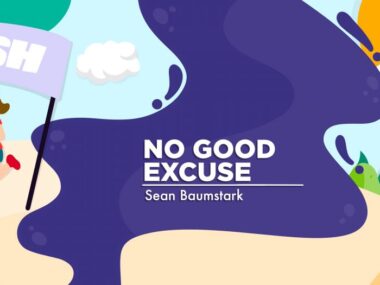Young Rapper Hopes to Inspire Others With His New Book
Written by |

Jacob Thompson wrote "From Diagnosis to Destiny" about his Friedreich's ataxia diagnosis and his dream of becoming a rapper. (Photos courtesy of Jacob Thompson)
Jacob Thompson began to hear an incessant ticking noise emanating from the engine of his 2002 Jeep Grand Cherokee. He played music to drown it. In doing so, he ignored a looming problem that ultimately put his car out of commission.
That’s the metaphor Thompson uses when he describes his journey with Friedreich’s ataxia (FA). He ignored the symptoms until he couldn’t anymore.
When Thompson, who always had regarded himself as an athlete, couldn’t stand up on a paddleboard no matter how hard he tried, he finally went to physical therapy.

Jacob Thompson’s book, “From Diagnosis to Destiny,” was released in November.
“As I kept falling in the water, my illusion that everything was okay kind of came crashing down with it,” said Thompson, 28, from his home in Minneapolis, Minnesota, in an interview with Friedreich’s Ataxia News.
At first, he thought it might have been too many concussions from playing football or hockey. Thompson went to M Health Fairview for a neurological workup. He saw an ataxia specialist who said he might have FA, and a month later a genetic test confirmed the doctor’s suspicions.
FA is a rare, progressive disease that affects the nerves and muscles, and leads to loss of control of body movements (ataxia) in about one of every 50,000 people, according to the National Institutes of Health. A wheelchair usually is required within 10 years of diagnosis. Thompson currently uses a cane.
In his first book, “From Diagnosis to Destiny,” which was released in November, Thompson writes about his experience leading up to his diagnosis at 24, the years after, and how he pivoted his dream of being a professional athlete to becoming a rapper and trying to help those around him.
For a long time, Thompson, who now splits his time mentoring teens through his church, coaching basketball, and recording raps and spoken-word poetry, had dreams of making it as a professional baseball player. But those dreams were dashed when he realized he wasn’t good enough to play in college. That was before his diagnosis, yet it drew him toward something he would be able to do despite FA symptoms.
At Bethel University, a Christian college in Minnesota, Thompson’s destiny began to form. Without a sport to play, Thompson turned to mentoring younger kids at his old high school. He also discovered a newfound talent with words.
“I knew I wanted to impact young people and then I figured out that I had this gift of spoken-word poetry, and eventually making music,” Thompson said. “And it was kind of like ‘Okay, well, now that I’m not playing sports, this is where I can put my energy, my focus.’ ”
His life also was dramatically changed thanks to his faith, which says that every believer is a new creation and has an identity in Jesus Christ. Thompson said his music and poetry is one way he can tell others about Christ while helping people of all faiths through their own difficulties, whether they have FA or not.
“Until I invested in my faith, I always felt sort of an emptiness that I tried to fill, you know, with different things,” Thompson said. “But it never really worked until I invested in my faith and found fulfillment and meaning.”
While attending Bethel, he performed spoken-word poetry for the first time as a freshman during welcome week. At this particular event, students were tasked with sharing their faith story. Thompson did it in a unique way. Unbeknown to him at the time, it was one of the moments that would lead him to music and his stage name.
When Thompson had music to release his senior year, he decided to combine the alphabetical numbers of his first and last initials to become TEN20. That moniker also happened to be an impactful Bible verse, Matthew 10:20, which says “For it will not be you speaking, but the Spirit of your Father speaking through you.”
Quite fitting, he thought, for pursuing a type of music in which speech is the primary medium.
Thompson released his first album, “Good Vibes: The Mixtape,” in 2017, and his second, “Pressure Makes Diamonds,” in 2019. The second album deals with his FA diagnosis and faith more directly.
In October, he released his single and music video “1 Of a Kind,” which he filmed with 12-year-old FA patient Cooper Carroll. It touches on the struggles of living with FA, such as wearing a back brace to prevent scoliosis, using a wheelchair, and being overlooked by peers. But it also gives hope, as Thompson raps, “You’re beautiful and you’re one of a kind / When God made you he had something special in mind.”
He used footage from an FA Research Alliance fundraising video and interspersed it with more recent shots of Carroll and Thompson walking side-by-side.
“From Diagnosis to Destiny” is the latest work he’s produced, and Thompson said there were many times when he thought about giving up. When he began thinking about the book 2½ years ago, he had no idea where to start, but his father encouraged him to just start writing.
Thompson was concerned initially about the book’s ending. He hadn’t yet become well-known for his music. He thought his story wasn’t good enough. But upon further reflection and encouragement from friends, he realized not having an ending where he has great success might help others going through their own challenges.
“The whole point of the book is whatever your situation may be, you can pursue your purpose in that space,” Thompson said. “You’re never gonna have a perfect ending or a perfect bow to kind of tie around your story.”
Thompson now has a growing family. He and his wife, Abigail, whom he married in 2016, two years before his diagnosis, are the parents of two young boys: Titus, 1, and Griffin, 8 months.
Even though Thompson is pursuing a music career and mentoring teens, and has written a book, he said living with FA is far from easy. He also said that he has a “lighter” case than others as he uses a cane and does not have speech issues. But some people with FA, like Cooper, need a wheelchair or walker. A patient Thompson connected with on Facebook died from COVID-19 because his heart wasn’t strong enough.
Thompson, as his book title suggests, is beginning to uncover his own purpose and goals in life, both within and outside the FA community.
“When I’m making new music or poetry or thinking about a speaking engagement, I’m thinking about somebody seeing my music somewhere, and deciding to keep living,” Thompson said. “It doesn’t always have to be that extreme, but I want to help people come back to life spiritually, emotionally, and mentally.”




